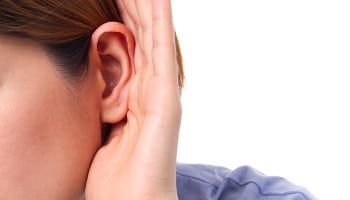Types of Hearing Loss

Hearing loss is described by varying degrees, not percentages. It can be be mild, moderate, moderately-severe, severe, or profound and vary across pitches. The type and degree of hearing loss is determined by a simple hearing test, and is measured as the amount of volume loss you experience compared to normal averages.
The volume, or intensity, of sounds you hear is measured in decibels (dB), with 0 dB being the softest whisper and 120 dB being a jet engine. The softest sounds one can hear are called thresholds. Normal hearing thresholds for adults are considered 0 to 25 dB.
When our hearing ability falls above normal thresholds, hearing loss is suspected. There are three main types of hearing loss:
- Conductive Hearing Loss
- Sensorineural Hearing Loss
- Mixed Hearing Loss
Conductive Hearing Loss
Conductive hearing loss occurs when there is a problem with the way sound is conducted to the inner ear or cochlea. The problem may lie in the outer ear (pinna or ear canal), eardrum (tympanic membrane), or the middle ear (ossicles and Eustachian tube). The inner ear remains unaffected in this type of hearing loss.
Some possible causes of conductive hearing loss are:
- Fluid in the middle ear from colds
- Ear infections
- Allergies
- Perforated eardrum
- Impacted cerumen (earwax)
- Benign tumors
- Swimmer’s ear
- Presence of a foreign body
- Absence or malformation of the outer ear, ear canal, or middle ear
Conductive hearing loss may be temporary or permanent, depending on the source of the problem. Medical management can correct some cases of conductive hearing loss, while amplification may be a recommended treatment option in more long-standing or permanent cases. Individuals with conductive hearing loss may report that sounds are muffled or quiet. Generally, when sounds are made louder, these individuals can hear well again.
Sensorineural Hearing Loss
Sensorineural (sen-sory-nuhral) hearing loss occurs when there is a problem with the sensory receptors of the hearing system, specifically in the cochlea of the inner ear. The majority of sensorineural hearing loss occurs as a result of an abnormality or damage to the hair cells in the cochlea. This abnormality prevents sound from being transmitted to the brain normally, resulting in hearing loss.
Other possible causes of sensorineural hearing loss are:
- Illnesses
- Drugs that are toxic to hearing
- Genetics
- Aging (presbycusis)
- Head trauma
- Malformation of the inner ear
- Exposure to loud noise
Sensorineural hearing loss is generally permanent and may stay stable or worsen over time. Routine hearing tests are needed to monitor the hearing loss. Amplification, including hearing aids, or cochlear implants in the most severe cases, is a common treatment recommendation. Individuals with sensorineural hearing loss may report muffled speech, ringing in the ears (tinnitus), difficulty hearing in background noise, or that others do not speak clearly.
Mixed Hearing Loss
Mixed hearing loss occurs when a person has an existing sensorineural hearing loss in combination with a conductive hearing loss. It is, quite literally, a mix of sensorineural and conductive hearing losses. This means there is a problem in the inner ear as well as in the outer or middle ear. The conductive hearing loss may be temporary or permanent, depending on the source of the problem.
Mixed hearing loss can sometimes be treated with medical management, and hearing aids are a common treatment recommendation.










